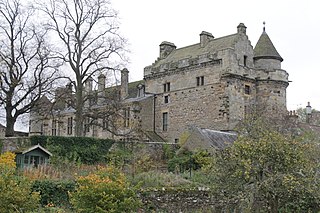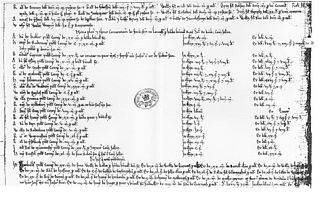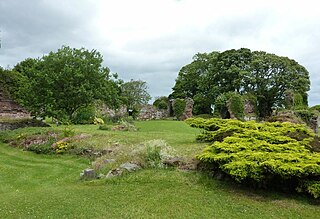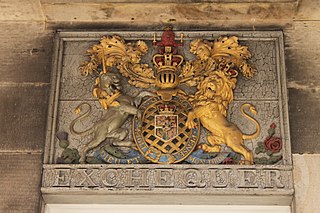Related Research Articles

In the civil service of the United Kingdom, His Majesty's Exchequer, or just the Exchequer, is the accounting process of central government and the government's current account in the Consolidated Fund. The term is used in various financial documents, including the latest departmental and agency annual accounts.

Dunfermline Palace is a ruined former Scottish royal palace and important tourist attraction in Dunfermline, Fife, Scotland. It is currently, along with other buildings of the adjacent Dunfermline Abbey, under the care of Historic Environment Scotland as a scheduled monument.

Falkland Palace, in Falkland, Fife, Scotland, is a royal palace of the Scottish Kings. It was one of the favourite places of Mary, Queen of Scots, who took refuge there from political and religious turmoil of her times.

The Pipe rolls, sometimes called the Great rolls or the Great Rolls of the Pipe, are a collection of financial records maintained by the English Exchequer, or Treasury, and its successors, as well as the Exchequer of Ireland. The earliest date from the 12th century, and the series extends, mostly complete, from then until 1833. They form the oldest continuous series of records concerning English governance kept by the English, British, Irish and United Kingdom governments, covering a span of about 700 years. The early medieval ones are especially useful for historical study, as they are some of the earliest financial records available from the Middle Ages. A similar set of records was developed for Normandy, which was ruled by the English kings from 1066 to 1205, but the Norman Pipe rolls have not survived in a continuous series like the English.
The Treasurer was a senior post in the pre-Union government of Scotland, the Privy Council of Scotland.

Lindores Abbey was a Tironensian abbey on the outskirts of Newburgh in Fife, Scotland. Now a reduced ruin, it lies on the southern banks of the River Tay, about 1-mile (1.6 km) north of the village of Lindores and is a scheduled ancient monument.

Berwick Castle is a ruined castle in Berwick-upon-Tweed, Northumberland, England.

The Scottish Exchequer had a similar role of auditing and deciding on royal revenues as in England. It was not until 1584 that it also became a court of law, separate from the King's Privy Council. Even then, the judicial and administrative roles never became completely separated into two bodies, as with the English Exchequer. The Auditor of the Exchequer played a pivotal role in this important office of state.

Dunskey Castle is a ruined, 12th-century tower house or castle, located 0.5 miles (0.80 km) south of the village of Portpatrick, Rhinns, Wigtownshire, on the south-west coast of Scotland.
The Comptroller of Scotland was a post in the pre-Union government of Scotland.
Sir Roger la Zouch was the instigator of the murder of Roger de Beler and also MP for Leicestershire in 1324, 1331 and 1337 and Sheriff of Warwickshire and Leicestershire during the 1330s.
Sir John Folville was an member of parliament (MP) for Rutland and Leicestershire and father of Eustace Folville, the leader of the Folville Gang. More recent research shows Farnham's Folville pedigree is flawed. The leader of the Folville gang was the issue of Sir Eustace by Dame Alice.
Sir Robert de Hellewell was a member of the Folville Gang that slew the corrupt Baron of the Exchequer, Sir Roger de Beler and was Rutland's MP in 1340.
Christian Lindsay was a Scottish poet and baker to the king.
James Hommyll, was a wealthy merchant in Edinburgh.
Jerome Bowie was a servant of James VI of Scotland as a sommelier and Master of the Wine Cellar, in charge of the purchase and serving of wine.

Helen Littil was a Scottish courtier, the nurse of King James VI and I.

Henry Kinghorn or de Kingorne was a Scottish clergyman, courtier, and steward or seneschal to Mary of Guelders, the wife of James II of Scotland. He also held the financial office of Chamberlain in Garioch and Brechin.

Drinksilver was a kind of tip or gratuity given to artisans in Early Modern Scotland, a sum of money suitable for buying drinks and celebrating. Records of payments give insights into labour, service, and patronage.

Duncan Forestar of Torwood and Skipinch was a Scottish courtier and financial administrator. He also served as Provost of Stirling.
References
- ↑ The Exchequer Rolls of Scotland, 1326-1600, 23 vols. (1878-1908)